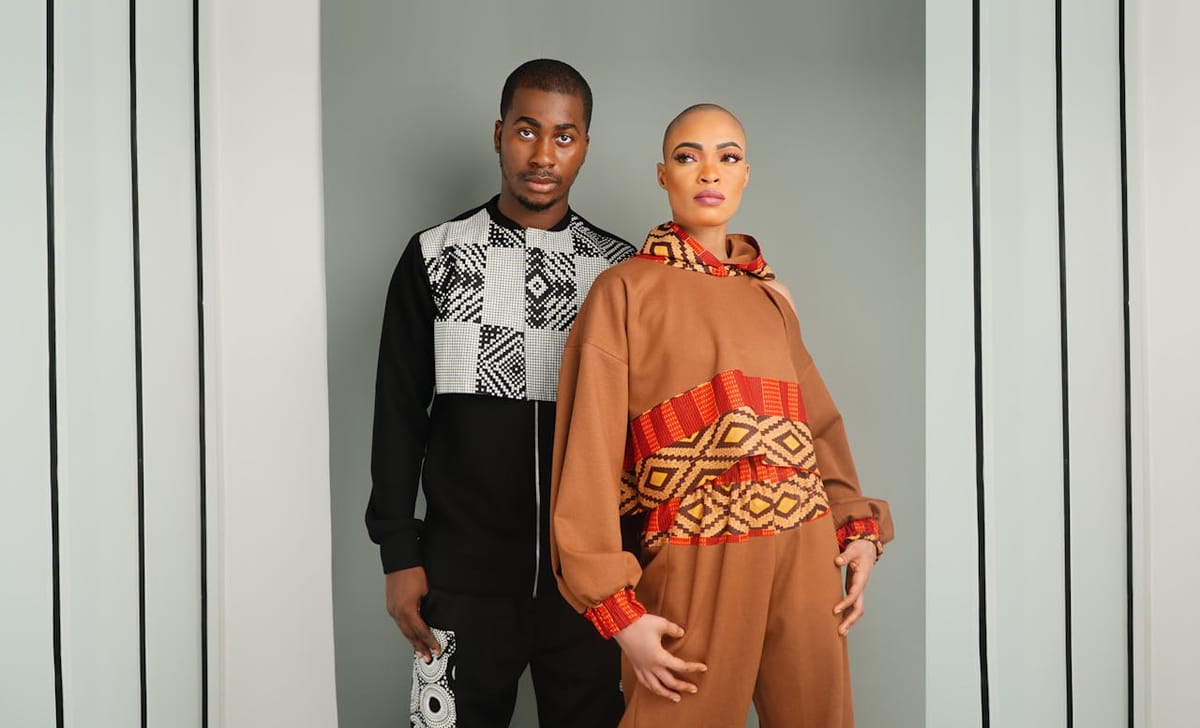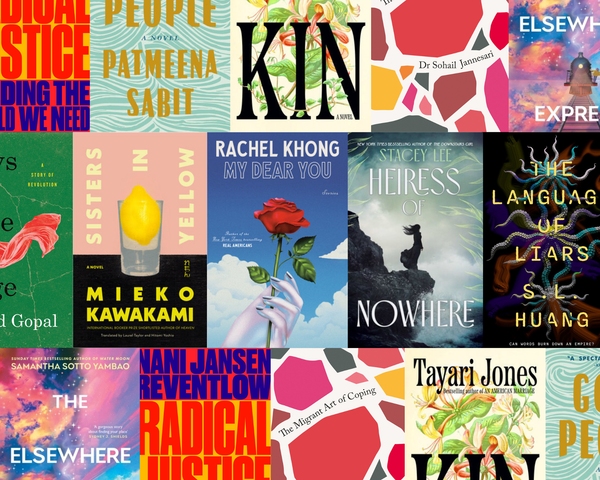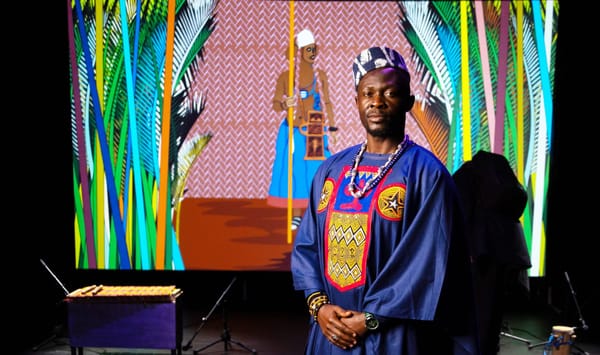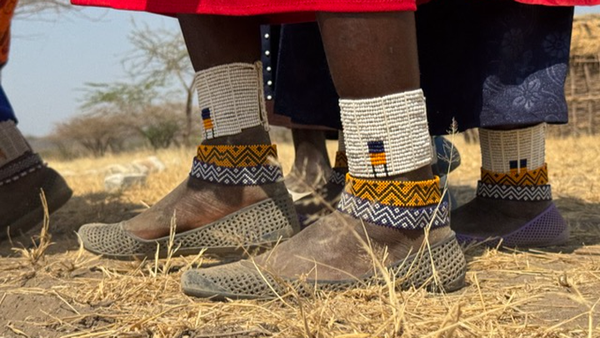Fashion as Resistance: An Interview with Barbara Kennedy-Brown of Fashion Minority Alliance
At a time when DEI is being rolled back and marginalised voices continue to be under threat, this interview is a reminder that resistance isn’t always loud, but always present.

This article is part of a series exploring Resistance as a Force for Change - in partnership with intersection, a borderless network visibilising people working on the frontlines of climate, social and racial justice. Through interviews and insight-led pieces, we examine how marginalised voices navigate, and challenge, systems of power. They are not just about survival, but about the radical act of imagining something better. They reflect the complexity of what it means to resist: the weight of history, the imprint of culture, and the structural forces that shape our lives. Real change begins when we reckon with these truths, and choose to build from them.
Access the Audio Read version directly on Spotify for Creators.
What if we stripped fashion from its neutrality? What if the clothes we wear - and who gets to design them, wear them, or even imagine them - were always political?
This is one of the questions that lingered in my mind after a conversation I attended a few months back in Paris, between Céline Semaan (founder of Slow Factory) and journalist Mélody Thomas. One of the topics addressed during that evening was fashion as resistance if can be political but whether we’re willing to admit it always has been.
It was with this in mind that I reached out to Barbara Kennedy-Brown, founder of the UK-based non-profit Fashion Minority Alliance (FMA). I’ve followed FMA’s work for years, and what has always stood out is its clarity: a refusal to make diversity performative, a commitment to real structural change, and a deep belief that fashion, when reclaimed, can be a tool for equity, memory, and transformation.
Barbara founded FMA during the racial justice uprisings of 2020 - a time of global reckoning around racial justice and equity. A moment, she tells me, when “it was clear that while fashion thrives on innovation and culture, it often excludes the very communities that inspire it.” FMA was born out of that contradiction: a bridge between what fashion claims to be and the communities it too often sidelines - providing them a platform and opportunities.
But what makes Barbara’s vision so powerful is that she doesn’t frame inclusion as charity. She frames it as justice, culture, and belonging.
“Fashion as resistance means refusing to accept invisibility,” she says.
“It means empowering creatives to tell their stories on their own terms.”
Throughout our exchange, Barbara reminded me again and again that representation alone isn’t enough. “We don’t just want seats at the table we want to redesign the table entirely so everyone is included and belongs.”
Her work is rooted in the realities of diaspora, of intergenerational exclusion, of talent ignored not because it isn’t brilliant, but because the system was never designed to see and acknowledge it. “Creatives from the Global Majority are not emerging,” she says pointedly. “They’ve always been here and brands and businesses are fully aware of this. What’s been missing is access.”
In our conversation, we also covered:
- Why performative gestures aren’t just ineffective, but harmful
- How “neutrality” is often code for protecting the status quo
- What decolonial work looks like in practice
- And what sustainable progress actually means in fashion, beyond who’s on the runway
At a time when fashion is trying to tell the world it has “moved on,” this conversation is a reminder that the real work happens far from the spotlight, and often in resistance to it.
“Fashion is more than aesthetics,” Barbara shares. “It’s a mirror of society. If we want a more just world, we need more just industries.”
You can find the full transcript of the interview below.
1. Can you introduce yourself, and share more information about FMA: what sparked its creation, what need(s) it’s filling today?
I’m Barbara Kennedy-Brown, the founder of Fashion Minority Alliance, which is an organisation born out of both necessity and a deep desire to see the fashion, beauty and creative industries reflect and engage the diversity of the world we live in. FMA was launched in 2020 during a time of global reckoning around racial justice and equity. It was clear that while fashion thrives on innovation and culture it often excludes the very communities that inspire it and FMA exists to bridge that gap by providing access and pathway opportunities to underserved creatives.
2. You lead an organisation rooted in equity, accountability, and creative freedom, while supporting creatives from the Global Majority. What values drive you personally that you’ve poured into FMA’s mission and work?
Equity, belonging, shared values, and creative freedom aren’t just buzzwords for us, they’re the foundation. We're driven by a belief in belonging and the power of storytelling to shift culture. We believe that by committing to transparency and collaboration it will result in the long-term impact on both the creative industries and FMA’s DNA. We don’t just want seats at the table we want to redesign the table entirely so everyone is included and belongs.
3. The phrase “fashion as resistance” has been central to a recent conversation I attended in Paris with Celine Semaan, Founder of Slow Factory. How does that idea resonate with you? Do you see fashion as a space of resistance, and how?
Fashion as resistance is a phrase that resonates deeply. Fashion has always been a form of resistance, whether through reclaiming cultural dress, challenging gender norms or using garments as statements. For us, resistance means refusing to accept invisibility. It means empowering creatives to tell their stories on their own terms and using the creative industries as a tool to disrupt systems of exclusion.
4. In light of the growing backlash against DEI and marginalised voices across industries, how is the current cultural and political climate shaping your work, and the wellbeing of the communities you support?
The current climate is, without a doubt, extremely challenging. We’re seeing a retrenchment in DEI efforts across sectors, often under the guise of “neutrality.” The problem is, neutrality isn’t harmless, it often reinforces the status quo. At FMA we’re doubling down on our mission by advocating for systemic change with even more vigour as we find it strange that companies within the creative ecosystem are uninterested in tapping into underserved creative talent when research and facts prove it is beneficial, not only for company culture and staff retention but also for their bottom lines.
5. Many of the creators and designers you work with come from backgrounds shaped by diaspora, lack of representation and opportunities. What have you learned from holding space for these voices, and what does meaningful representation really look like for you?
Our mission is to work with all underserved groups as we feel that it is the only way to ensure agency and belonging for all as opposed to just visibility. That is the only way you can begin to shape narratives, not just appear in them. Meaningful belonging, for all, means investing in talent not tokenising it. It means listening deeply, co-creating solutions and honouring the multiplicity of identities and experiences.
6. Your work goes in favour of structural change. What does sustainable progress actually look like in fashion, and what metrics or behaviours signal that we’re moving in the right (or wrong) direction? How do you try to rectify that with FMA?
Sustainable progress looks like equity embedded at every level; from hiring practices to boardrooms to supply chains. It’s not just about who’s on the runway but who’s behind the camera, in the design studio, in the buying department, and making decisions. Our Road to Inclusivity report, which we co-produced with Blurred Global, used metrics that included retention of diverse talent, equitable pay and authentic community engagement and offers simple, easy to institute pathways forward. It also shows that performative gestures, without structural change, is ineffective.
7. Decolonial thinking comes up more often today in climate justice spaces, but is still a touchy point in many industries like fashion. How do you interpret decolonial work in the context of FMA?
Decolonial thinking in fashion means engaging in an effective and holistic manner with who holds power, who profits and whose stories are told. It’s about dismantling Eurocentric standards of beauty and creativity and also uplifting underserved communities’ knowledge systems and craft. At FMA, we approach this by centring lived experience, challenging extractive practices and advocating for belonging in the industry.
8. Whether it’s through design, storytelling, or education, FMA has always amplified creators from the Global Majority. What’s one thing you wish more people understood about the importance of this work, especially now?
One thing I wish more people understood is that this work isn’t about charity, it’s about belonging for all. Creatives from the Global Majority are not emerging, they’ve always been here and brands and businesses are fully aware of this. What’s been missing is access. When we amplify these voices, alongside all underserved voices, we’re not just diversifying fashion, we’re enriching it.
9. Lastly, what do you hope people take away from the work FMA is doing today? And how can our readers support or get involved?
I hope people see that change is possible. FMA is proof that when you invest in people, you unlock brilliance. To support us, follow our work, mentor emerging talent, advocate for change, pay living wage fees to interns, and partner with us to create real opportunities. Whether you’re an individual or a brand, there’s a role for you in this movement.
10. Anything else you’d like to share with us?
Fashion is more than aesthetics, it’s a mirror of society. If we want a more just world, we need more just industries. At FMA we’re not waiting for permission to build it. We’re doing it now, with community, adaptability, courage, creativity and talent at the core.
→ Follow Fashion Minority Alliance to learn more about their work, support emerging talent, and be part of building a more just fashion industry.
intersection is a borderless network visibilising people working on the frontlines of climate, social and racial justice. To find out more about its work, mission, and become a member, visit https://intersection-network.carrd.co/.





